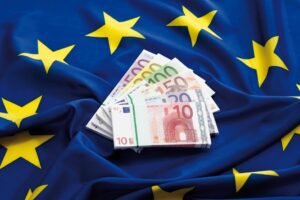
Natural gas supply to Ukraine from EU countries in November 2022 amounted to 228 mln. cubic meters, 27.7% less than in October (315.4 mln. cubic meters), operational data of GTS Operator of Ukraine show.
In particular, the supply of gas to the “customs warehouse” UGS in November made 191.1 million cubic meters against 261.9 million cubic meters in October.
In November, Romania with a modest volume of 0.3 million cubic meters was added to the gas supply to the Ukrainian GTS from Poland, Slovakia and Hungary. At the same time, in the morning of December 2, 8.7 million cubic meters of the total volume was received at the entrance from Romania out of a total of 18.1 million cubic meters. Romanian volumes bypassed the “customs warehouse”.
According to the analytical publication ICIS, Moldova imports gas from Romania through the Trans-Balkan pipeline. Volumes delivered through the Greece-Bulgaria interconnector (IGB) were physically sent north to Moldova via the Trans-Balkan line via Romania and Ukraine.
Once the volumes enter Moldova through the southern border crossing of Causeni, they can be subtracted from the volumes entering Moldova from Ukraine through the Grebeninki border crossing in the north, a regional source told ICIS.
“It took almost six years to unblock the network in the region and start physical gas supplies from alternative directions,” former UGTSU head Sergei Makogon said in a comment to ICIS.
As reported, in September 2022, from the territory of Poland, Slovakia and Hungary to Ukraine received 29.4 million cubic meters (TC – 17.4 million cubic meters), August – 142.1 million cubic meters (120.7 million cubic meters), July – 119 million cubic meters (82.6 million cubic meters). The Trans-Balkan Gas Pipeline is located in the northern part of the Russian Federation, in July – 119 million cubic meters (82.6 million cubic meters), June – 46.1 million cubic meters (6.6 million cubic meters), May – 24 million cubic meters (4.9 million cubic meters), April – 3.2 million cubic meters (3.2 million cubic meters), March – 282.3 million cubic meters (10 million cubic meters), February – 349.7 million cubic meters (11 million cubic meters), January – 47 million cubic meters (0.0 million cubic meters).
The Trans-Balkan pipeline is a trunk gas pipeline crossing the territory of Ukraine, Moldova, Romania, Bulgaria and Turkey.

The European Union will send 40 generators to Ukraine as part of its support in addition to the already supplied 550, European Union diplomatic chief Josep Borrel said.
“Russia is trying to break Ukraine’s fighting spirit by striking at its energy infrastructure and using winter as a weapon of war against civilians. At the G7 meeting, we are coordinating our support; the EU is sending 40 generators in addition to the 550 already provided through the European Civil Protection and Humanitarian Aid Operations mechanism,” Borrel wrote on Twitter Wednesday.
As reported, the European Commission reported that 200 medium transformers and a large autotransformer from Lithuania, a medium autotransformer from Latvia and 40 heavy generators from the EC reserve located in Romania (rescEU) were prepared to be sent to Ukraine through the EU Emergency Response Coordination Center. According to the report, each of the generators can provide uninterrupted power to a small or medium-sized hospital.
The EC is also additionally working on a new rescEU energy hub in Poland to provide assistance from third parties and facilitate its coordinated delivery to Ukraine, including with G7 partners.

The EU Talent Fund trial project has created an online job search tool for Ukrainian citizens fleeing the war and looking for work in the EU.
According to the Ukrainian Foreign Ministry’s press service on Friday, the portal can be used by Ukrainian citizens who are on the territory of EU member states as temporarily displaced persons.
“The EU Talent Trial Fund is an opportunity to upload your resume and find your employer. The portal is used by more than 4,000 public employment services and private employment agencies. And that’s more than 3 million job openings from a variety of fields,” the report says.
Finland, Lithuania, Poland, Slovakia, Croatia, Spain and Cyprus take part in the project, according to the Fund’s page on the European Commission’s website.

Ukraine on Tuesday received another EUR2.5 billion tranche under the current EU macro-financial assistance (MFF) program, the Finance Ministry said on its website.
“We are sincerely grateful to the EU for the financial support provided to Ukraine. The funds received will significantly help to ensure urgent state budget expenditures and maintain economic stability in the state,” the ministry quoted Minister Serhiy Marchenko as saying.
The total amount of the EU macrofinancial assistance to Ukraine has reached EUR6.7 billion since February 24, the Ministry of Finance said.
It is assumed that Ukraine will receive the last tranche within the framework of the eighth program of macrofinancial assistance by the end of this year, the ministry noted.
As earlier reported, in late May-early June this year, the EU pre-approved a new emergency macrofinancial assistance to Ukraine for EUR 9 billion, of which EUR 1 billion was allocated in early August. The rest EUR 8 billion was expected to come in one tranche, but the final decision was delayed. One of the reasons for that was a discussion of whether to provide the money in the form of loans or grants.
As a result, only EUR2 billion arrived in the middle of October, and the vice-president of the European Commission Valdis Dombrovskis said that the third tranche of EUR3 billion was expected in early December. Later he specified that EUR2,5 billion will arrive in the end of November and EUR0,5 billion – in the beginning of December, while the remaining EUR3 billion of the initial EUR9 billion is included in the new program of financial aid to Ukraine in 2023 for the total amount of EUR18 billion.
In all cases, we are talking about credit funds, but allocated on concessional terms.

A climate office will be created in Ukraine as part of the international technical assistance project of the German Federal Ministry of Economics and Climate Protection (BMWK)/EU “Development of Capacity for Climate Action,” said Minister of Environmental Protection and Natural Resources of Ukraine Ruslan Strilets.
“The establishment of the Ukrainian Climate Office is an excellent example of support for Ukraine from our long-standing and reliable partners – BMWK and the EU, which will be implemented by GIZ. I invite all countries seeking to contribute to the overcoming of global warming, to cooperate in the framework of this initiative,” – said the head of the Ministry of Natural Resources at the UN climate conference COP27, the words of which are given in the message of the Ministry in the telegram channel.
They clarified that the official launch of the office took place on Tuesday in the framework of the COP27.
As noted, the project will be co-financed by the EU and the International Climate Initiative (IKI) BMWK, and its goal is to provide real assistance to Ukraine in the implementation of climate goals towards decarbonization.
According to Strilz, the climate office will support the Ukrainian government, cities and regions, as well as enterprises and businesses to implement elements of climate policy.
In addition, it will, in particular, help with the decarbonization of sectors of the economy, with the expansion of opportunities for youth and regions on the way to the EU Green Deal and the implementation of the Paris Agreement provisions.
One of the priorities of its activities will be the development and support of special approaches to climate finance for Ukraine.
At the same time, the report notes that according to the latest estimates of the Ministry of Environment and international experts, additional greenhouse gas emissions caused by military action in Ukraine has already amounted to about 33 million tons of CO2, the largest share of which accounts for more than 23 million tons of CO2.
At the same time, according to preliminary estimates, the recovery will account for approximately 49 million tons of emissions.
At the same time, Strilets stressed that Ukraine has not abandoned for one day its obligations to the world community, including those related to climate policy, and has not abandoned its intention to reduce greenhouse gas emissions by 65% by 2030.

KSG Agro rented an oil extraction plant (OEZ) in Dnipropetrovsk region to produce virgin sunflower oil from its own raw material.
According to the agricultural holding’s press release issued on Friday, the crude sunflower oil it produces will be exported to European Union countries by road.
It is specified that the capacity of rented crushing plant allows processing 2.5 thousand tons of sunflower seeds into 1 thousand tons of sunflower oil per month. Staff of the factory consists of 30 persons. The production is equipped with modern equipment manufactured in Ukraine in 2008.
Agroholding reminded that after the start of a full-scale Russian military invasion into Ukraine, it began exporting rapeseed and sunflower oil to Poland, Slovakia and Italy. In addition, it began pilot shipments of sunflower oil to Poland and Italy using “flexitanks” – polymeric containers designed to transport liquid cargo and installed on trucks.
The vertically integrated holding KSG Agro is engaged in pig farming as well as the production, storage, processing and sale of grain and oilseeds. Its land bank is about 21,000 hectares.
According to the agricultural holding, it is one of the top five pork producers in Ukraine.
In 2021, the holding increased its net profit in 16 times compared with 2020 – up to $20.27 million, revenue – by 44%, to $30.75 million, while increasing EBITDA by half – to $12.28 million.
The owner and chairman of the board of directors of KSG Agro is Sergey Kasyanov.